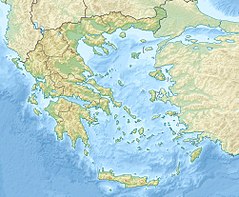Rio-Antirrio bridge
| Rio–Antirrio Bridge Γέφυρα Ρίου - Αντιρρίου |
|
|---|---|

The bridge on a windy day
|
|
| Carries | 6 lanes of Ionia Odos, (2 lanes each way & 2 emergency lanes) & 1 pedestrian & bicycle lane, European route E65 |
| Crosses | Gulf of Corinth |
| Locale |
|
| Official name | Charilaos Trikoupis Bridge |
| Owner | Greek State |
| Maintained by | Gefyra SA |
| Characteristics | |
| Design | Cable-stayed bridge by Berdj Mikaelian |
| Total length | 2,880 meters (9,450 ft) |
| Width | 27.2 meters (89 ft) |
| Longest span | 560 meters (1,840 ft) |
| History | |
| Opened | 7 August 2004 |
| Statistics | |
| Daily traffic | Expected: 11,000 vehicles/day |
| Toll | Cars: 13.20 € Motorcycles: 1.90 € Coaches: 29.70–64.00 € Trucks: 19.90–41.00 € |
The Rio–Antirrio Bridge (Greek: Γέφυρα Ρίου-Αντιρρίου), officially the Charilaos Trikoupis Bridge after the statesman who first envisaged it, is one of the world's longest multi-span cable-stayed bridges and the longest of the fully suspended type. It crosses the Gulf of Corinth near Patras, linking the town of Rio on the Peloponnese peninsula to Antirrio on mainland Greece by road.
The bridge accommodates both pedestrian and motor vehicle traffic.
Its official name is the Charilaos Trikoupis Bridge. Charilaos Trikoupis was a 19th-century prime minister of Greece; he suggested the idea of building a bridge between Rio and Antirrio. The project was too expensive at the time, when Greece was trying to get a late start in the Industrial Revolution.
The Greek word gefyra (bridge) also refers to the Rio-Antirio bridge in informal everyday speech, originating from the domain name of the bridge's official internet site.
The 2,880 m (9,449 ft) long bridge (approximately 1.8 miles) dramatically improves access to and from the Peloponnese, which could previously be reached only by ferry or via the isthmus of Corinth in the east. Its width is 28 m (92 ft) — it has two vehicle lanes per direction, an emergency lane and a pedestrian walkway. Its five-span four-pylon cable-stayed portion of length 2,252 m (7,388 ft) is the world's second longest cable-stayed deck; only the deck of the Millau Viaduct in southern France is longer at 2,460 m (8,071 ft). However, as the latter is also supported by bearings at the pylons apart from cable stays, the Rio–Antirrio Bridge deck might be considered the longest cable-stayed "suspended" deck.
...
Wikipedia

